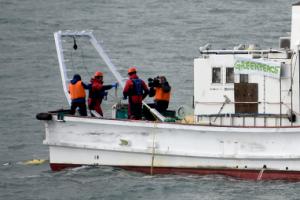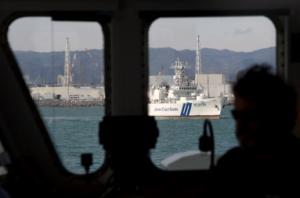Nuclear water: Fukushima still faces contamination crisis
Onahama (Japan) (AFP) - Fish market vendor Satoshi Nakano knows which fish caught in the radiation tainted sea off the Fukushima coast should be kept away from dinner tables.
Yet five years after the worst nuclear accident since Chernobyl there is still no consensus on the true extent of the damage -- exacerbating consumer fears about what is safe to eat.
Environmentalists are at odds with authorities, warning the huge amounts of radiation that seeped into coastal waters after a powerful tsunami caused a meltdown at the Fukushima Daiichi nuclear power plant on March 11, 2011, could cause problems for decades.
The Japanese government is confident it has stemmed the flow of radioactive water into the ocean, but campaigners insist contaminated ground water has continued to seep into the Pacific Ocean, and the situation needs further investigation.
"It was the single largest release of radioactivity to the marine environment in history," Greenpeace nuclear expert Shaun Burnie told AFP on the deck of the campaign group's flagship Rainbow Warrior, which has sailed in to support a three-week marine survey of the area the environmental watchdog is conducting.
Fukushima is facing an "enormous nuclear water crisis," Burnie warned.
He added: "The whole idea that this accident happened five years ago and that Fukushima and Japan have moved on is completely wrong."

- Safe to eat? -
Existing contamination means fishermen are banned from operating within a 20-kilometre (12.4-mile) radius from the plant.
Although there are no figures for attitudes on seafood alone, the latest official survey by the government's Consumer Affairs Agency showed in September that more than 17 percent of Japanese are reluctant to eat food from Fukushima.
Nakano knows it's best for business to carefully consider the type of seafood he sells, in the hope it will quell consumer fears.
"High levels of radioactivity are usually detected in fish that move little and stick to the seabed. I am not an expert, but I think those kinds of fish suck up the dirt of the ocean floor," he told AFP from his hometown of Onahama by the sea.
Greenpeace is surveying waters near the Fukushima plant, dredging up sediment from the ocean floor to check both for radiation "hotspots" as well as places that are not contaminated.
